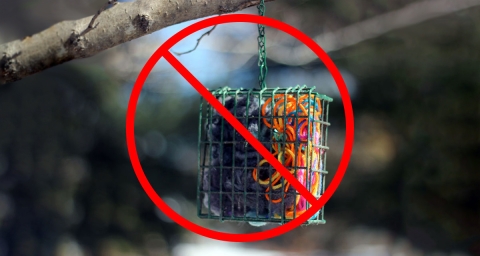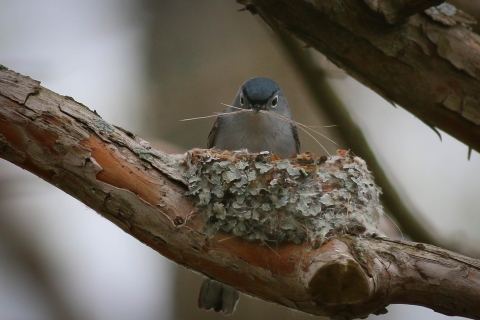We’ve been seeing a lot of tips for providing food, water and nesting materials to animals. Unfortunately, many of those tips are misguided end up being detrimental to the species we all want to help. Here are a few pitfalls you should avoid and some great alternatives that will help keep animals safe!
Avoid: String, twine, yarn, dryer lint and pet hair
String, twine and yarn can get wrapped around the legs and necks of birds and nestlings, cutting off circulation and often resulting in death. Stringy items can also become a choking hazard if mistaken for food. Never offer dryer lint as it could contain chemicals that are harmful to birds. Pet hair may also be dangerous due to chemicals from flea treatments and shampoos.
Provide: Natural, chemical free materials
t’s important to remember that birds are well adapted and get by just fine without human intervention. If you want to help provide nesting materials, focus on things birds would naturally find. You can gather twigs, leaves, seeds, mosses, lichens and untreated grass clippings. These nesting materials can be piled on the ground or placed in clean suet cages.
Avoid: Bread and sugar sponges
Bread and sugar sponges can quickly introduce harmful bacteria and mold, causing respiratory issues and disease, sometimes resulting in death. Birds easily fill up on bread, leaving little room for the more nutritious foods they need. Just like people, animals can suffer from metabolic bone disease if they don’t get the proper nutrients. Even with treatment, this disease is often irreversible. In the wild, animals may starve to death or be unable to escape predators.
Provide: Natural, nutritious foods
It’s easy to provide the high nutrition foods that animals need. The best way to provide food for butterflies, hummingbirds and other pollinators is to plant a garden with a wide variety of native plants that bloom from early spring through late fall. Many of these same plants provide late fall to early winter seeds for a variety of birds. You can also add and properly maintain a hummingbird feeder for added nectar. Different types of seed and food will attract different bird species throughout the year. Just like nectar feeders, seed feeders should be cleaned regularly.
Avoid: Adding salt to bird baths
Salt can be toxic to birds, sometimes resulting in death in less than an hour. Birds may experience reduced reaction time and lose the ability to perch or fly. Salt water can also be dangerous to deer, squirrels and any other creatures that may be looking for a drink. The effects of salt are particularly dangerous in the winter when animals are less hydrated and fresh drinking water is difficult to find.
Provide: Heated bird baths
If you want to ensure that wintering birds have fresh water available, install a heated bird bath or add a heated rock to your existing bird bath. Shallow baths with areas to perch are ideal for providing easy access to drinking water. Keep in mind that birds won’t bathe when it’s chilly, but fresh drinking water is essential!













